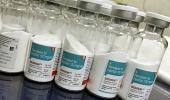At a time when the country’s medical infrastructure has become incapable of handling the pressure of Covid’s deadly second wave, a parallel wave of conmen, black marketers and counterfeiters can be witnessed across the country.
Geetanjali Krishna reports.

On May 6, Delhi Police raided a South Delhi farmhouse and an upscale Lodhi Colony restaurant.
In the largest haul so far, they seized over 400 oxygen concentrators intended to be sold in the black market at almost 3.5 times their actual price.
On the same day, the Delhi government capped the maximum rates private ambulance services can charge, amid reports that they have been charging two to five times their normal rates during the second Covid wave.
Four days prior to this, officers from Delhi’s Shahdara district arrested two individuals with a cache of fake Remdesivir, which they had been selling for Rs 35,000 per injection.
On May 7, in another raid, the police seized more than a hundred oxygen concentrators from two popular eateries in Khan Market, which is counted among the world’s most expensive retail destinations and is known to be a haunt of Delhi’s elite.
At a time when the country’s medical infrastructure has become incapable of handling the pressure of Covid’s deadly second wave, a parallel wave of conmen, black marketers and counterfeiters can be witnessed across the country.
A growing number of people in urgent need of oxygen cylinders, concentrators, essential Covid medicines and even oxygen beds in hospitals is resorting to the black market.
On social media, many more are calling out fly-by-night operators who have decamped after taking hefty cash advances or delivered fake oxygen cylinders and medicines like Remdesivir, Fabiflu and Tocilizumab.
Consider these examples: When a household of seven in West Delhi tested positive on May 3, 2021, and two members urgently needed high-flow oxygen, they paid a 50 per cent advance of Rs 50,000 for a cylinder to an unknown supplier who promised to deliver it within a few hours. They have not heard from him after that. Desperate, they paid Rs 1 lakh for another cylinder, which they finally received hours later. The cylinder should have normally cost no more than Rs 4,000.
Another Delhi man reports having paid over Rs 1 lakh to a contact on Twitter to set up a home ICU for his critically ill father.
The minute he transferred the money, the contact switched his phone off and has not been heard of since.
When a Panipat resident was prescribed Remdesivir after her temperature and oxygen saturation remained unstable even after 10 days, she tapped online resources to buy it for Rs 30,000 (its MRP is under Rs 3,000).
She has taken the medicine even though she has no way of checking if it is genuine or not.
Meeta Mastani, who runs the Facebook group “Covid Community Delhi/NCR -Information Facts Support”, which was set up to crowdsource information about Covid, says that during her daily verification of posts offering equipment, medicines, plasma and more on the group, at least five turn out to be suspect.
Over the last 10 days, she has identified several red flags.
“When a service provider does not list an address, insists on a 50 per cent online advance and offers to home deliver the equipment,” she says, “alarm bells start to ring in my head.”
Most of the times in such cases, when she insists they furnish an address from where she can pick up the equipment herself, they hang up and block her number.
While Mastani, several other civil society groups and the radio channel Red FM are calling out such scamsters, she believes that they will persist as long as the public does not receive reliable information from the government about the Covid-related health infrastructure available.
The demand for better quality information about health infrastructure is not new.
Long before the pandemic, the Right to Information campaigners had argued that the government should disclose how many hospital beds (both for the economically weaker section [EWS] and regular) are available.
On May 2, 2021, RTI activist Anjali Bhardwaj of Satark Nagrik Sangathan, a Delhi-based citizens’ group working to promote transparency and accountability in government functioning, filed an intervention in the ongoing suo motu case in the Supreme Court regarding the distribution of essential health supplies, highlighting the need for verified, updated information on availability of beds, essential drugs and distribution of oxygen.
“We have asked that Covid hospitals, government and private, in every state should disclose the number of available beds with oxygen, beds without oxygen, ICU beds equipped with ventilators and those without every eight hours,” says Bhardwaj.
The intervention seeks disclosure of the name and stock position of essential drugs held by each hospital.
Further, it suggests that a dedicated website be maintained by the Centre with information on the requirement and supply of oxygen to each state.
“This will ensure easier access to life-saving resources for Covid patients,” says Bhardwaj. “It will also prevent black marketing, hoarding, extortion and cornering of resources by vested interests by enabling public monitoring.”












 © 2025
© 2025